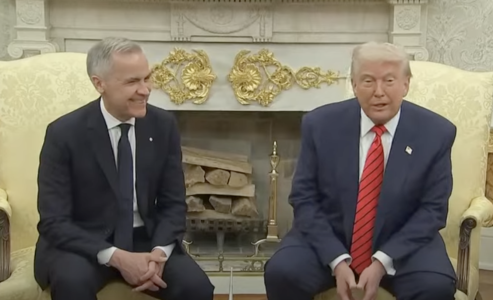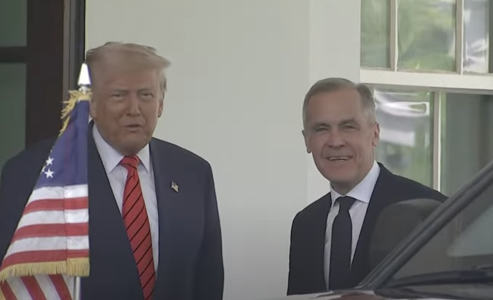Prime Minister Mark Carney pushes back on Trump: “Canada is not for sale”
- Replies 1
In a world where international headlines are often dominated by trade wars, political posturing, and the occasional diplomatic faux pas, it’s not every day you see a world leader stand up in the Oval Office and deliver a message that’s as clear as it is unshakable.
But that’s exactly what happened when Canada’s new Prime Minister, Mark Carney, sat down with President Donald Trump for their first high-stakes meeting since Carney’s stunning election victory.
The Setting
Canadian Prime Minister Mark Carney told President Donald Trump that Canada is "not for sale" during a bilateral meeting in the Oval Office on May 6, shortly after Carney's Liberal Party secured a decisive election victory.
“As you know from real estate, there are some places that are never for sale. We're sitting in one right now,” Carney remarked at the outset of their meeting at the White House.
“Having met with the owners of Canada over the course of the campaign the last several months, it's not for sale. It won't be for sale ever,” he continued. “But the opportunity is in the partnership and what we can build together.”

A Not-So-Subtle Response to Trump’s “51st State” Dream
Carney’s remarks came in response to Trump’s repeated suggestions that Canada would benefit from becoming the “51st state,” rhetoric he used during his campaign and credited for helping him win the April 28 election, after trailing in the polls.
Carney took over as prime minister in March, succeeding fellow Liberal Justin Trudeau.
During the meeting, Trump reiterated his belief that Canadians would be better off as part of the US.
“I still believe that, but it takes two to tango, right?” he said. “I believe it would be a massive tax cut for the Canadian citizens. You get free military, you get tremendous medical cares and other things. There would be a lot of advantages.”
When asked whether Carney's firm stance complicated the conversation, Trump dismissed the notion.
“Time will tell,” he responded. “It's only time. But I say, never say never. I've had many, many things that were not doable, and they ended up being doable.”
Carney, however, pushed back again later in the meeting, stating, “Respectfully, Canadians' view on this [on the 51st state] is not going to change.”
At a press conference held afterward at the Canadian embassy, Carney told reporters that he directly requested Trump to stop referring to Canada as the “51st state.”

"I've been careful always to distinguish between wish and reality. I was clear there, in the Oval Office, as I've been clear throughout on behalf of Canadians that this is never going to happen," Carney said.
Trade Tensions and Tough Talk
Their meeting also addressed ongoing trade disputes, particularly the 25% tariffs the US has imposed on Canadian imports.
Trump confirmed that while they would talk about the tariffs and possible “subtle changes” to the US-Mexico-Canada Agreement, the tariffs would remain.
“We've been ripped off by everybody for 50 years ‒ for 50 years ‒ and we're just not going to do that anymore,” he said.
When asked whether Carney could say anything to convince him to lift the tariffs, Trump replied, “No. Just the way it is.”
Trump, who frequently clashed with Carney’s predecessor—whom he referred to as “Governor Trudeau”—spoke more warmly about Carney himself.
A Political Back-and-Forth
He opened their meeting by telling Carney he was “probably the greatest thing that happened to him,” alluding to how Carney’s campaign benefited politically from Trump’s antagonism toward Canada.
“But I can't take full credit,” Trump added. “His party was losing by a lot, and he ended up winning. So, I really want to congratulate him with probably one of the greatest comebacks in the history of politics, maybe even greater than mine.”
“He ran a really great campaign. He did a really great debate,” Trump said.
Source: CBS News / Youtube.
Why This Moment Matters
Despite their policy differences, Trump emphasized that the US would remain friends with Canada “regardless of anything,” and expressed admiration for Canadians, mentioning retired hockey legend Wayne Gretzky and NHL star Alexander Ovechkin—though the latter is Russian, not Canadian.
Carney expressed appreciation for the meeting and for Trump’s leadership.
“You're a transformational president,” he said, noting Trump’s “focus on the economy, with a relentless focus on the American worker.”
He also commended him for “securing your borders,” combating the “scourge of fentanyl,” and “securing the world.”
“The history of Canada and the US is [that] we're stronger when we work together. And there's many opportunities to work together,” Carney concluded.

What do you think about Prime Minister Carney’s? Do you think Canada and the US can find a way to work through their differences? Share your thoughts in the comments below!
But that’s exactly what happened when Canada’s new Prime Minister, Mark Carney, sat down with President Donald Trump for their first high-stakes meeting since Carney’s stunning election victory.
The Setting
Canadian Prime Minister Mark Carney told President Donald Trump that Canada is "not for sale" during a bilateral meeting in the Oval Office on May 6, shortly after Carney's Liberal Party secured a decisive election victory.
“As you know from real estate, there are some places that are never for sale. We're sitting in one right now,” Carney remarked at the outset of their meeting at the White House.
“Having met with the owners of Canada over the course of the campaign the last several months, it's not for sale. It won't be for sale ever,” he continued. “But the opportunity is in the partnership and what we can build together.”

Canadian Prime Minister Mark Carney firmly told President Trump that Canada is”'not for sale”, directly rejecting Trump’s comments about wanting Canada as the “51st state”. Image source: CNBC Television / Youtube.
A Not-So-Subtle Response to Trump’s “51st State” Dream
Carney’s remarks came in response to Trump’s repeated suggestions that Canada would benefit from becoming the “51st state,” rhetoric he used during his campaign and credited for helping him win the April 28 election, after trailing in the polls.
Carney took over as prime minister in March, succeeding fellow Liberal Justin Trudeau.
During the meeting, Trump reiterated his belief that Canadians would be better off as part of the US.
“I still believe that, but it takes two to tango, right?” he said. “I believe it would be a massive tax cut for the Canadian citizens. You get free military, you get tremendous medical cares and other things. There would be a lot of advantages.”
When asked whether Carney's firm stance complicated the conversation, Trump dismissed the notion.
“Time will tell,” he responded. “It's only time. But I say, never say never. I've had many, many things that were not doable, and they ended up being doable.”
Carney, however, pushed back again later in the meeting, stating, “Respectfully, Canadians' view on this [on the 51st state] is not going to change.”
At a press conference held afterward at the Canadian embassy, Carney told reporters that he directly requested Trump to stop referring to Canada as the “51st state.”

Carney’s stance followed Trump’s ongoing rhetoric about integrating Canada more closely with the United States. Image source: Fox News / Youtube.
"I've been careful always to distinguish between wish and reality. I was clear there, in the Oval Office, as I've been clear throughout on behalf of Canadians that this is never going to happen," Carney said.
Trade Tensions and Tough Talk
Their meeting also addressed ongoing trade disputes, particularly the 25% tariffs the US has imposed on Canadian imports.
Trump confirmed that while they would talk about the tariffs and possible “subtle changes” to the US-Mexico-Canada Agreement, the tariffs would remain.
“We've been ripped off by everybody for 50 years ‒ for 50 years ‒ and we're just not going to do that anymore,” he said.
When asked whether Carney could say anything to convince him to lift the tariffs, Trump replied, “No. Just the way it is.”
Trump, who frequently clashed with Carney’s predecessor—whom he referred to as “Governor Trudeau”—spoke more warmly about Carney himself.
A Political Back-and-Forth
He opened their meeting by telling Carney he was “probably the greatest thing that happened to him,” alluding to how Carney’s campaign benefited politically from Trump’s antagonism toward Canada.
“But I can't take full credit,” Trump added. “His party was losing by a lot, and he ended up winning. So, I really want to congratulate him with probably one of the greatest comebacks in the history of politics, maybe even greater than mine.”
“He ran a really great campaign. He did a really great debate,” Trump said.
Source: CBS News / Youtube.
Why This Moment Matters
Despite their policy differences, Trump emphasized that the US would remain friends with Canada “regardless of anything,” and expressed admiration for Canadians, mentioning retired hockey legend Wayne Gretzky and NHL star Alexander Ovechkin—though the latter is Russian, not Canadian.
Carney expressed appreciation for the meeting and for Trump’s leadership.
“You're a transformational president,” he said, noting Trump’s “focus on the economy, with a relentless focus on the American worker.”
He also commended him for “securing your borders,” combating the “scourge of fentanyl,” and “securing the world.”
“The history of Canada and the US is [that] we're stronger when we work together. And there's many opportunities to work together,” Carney concluded.
Key Takeaways
- Canadian Prime Minister Mark Carney firmly told President Trump that Canada is”'not for sale”, directly rejecting Trump’s comments about wanting Canada as the “51st state”.
- Carney’s stance followed Trump’s ongoing rhetoric about integrating Canada more closely with the United States, which he claims would benefit Canadians, especially through promised tax cuts and other perceived advantages.
- Despite ongoing trade tensions and US tariffs on Canadian imports, as well as Trump’s reluctance to lift them, both leaders discussed the future of their economic partnership and the United States-Mexico-Canada Agreement.
- Carney used Trump’s attitudes toward Canada to rally political support, leading to Carney’s recent election win, while both leaders emphasized the strong and enduring relationship between the two nations, even amid disagreements.
What do you think about Prime Minister Carney’s? Do you think Canada and the US can find a way to work through their differences? Share your thoughts in the comments below!






